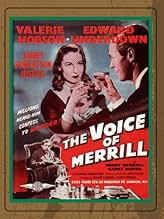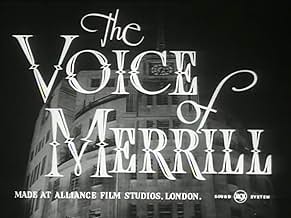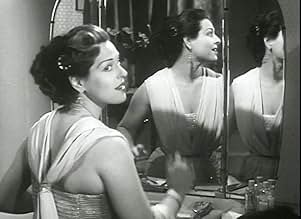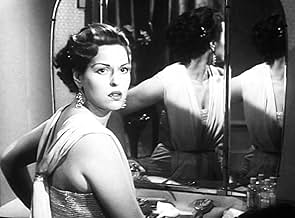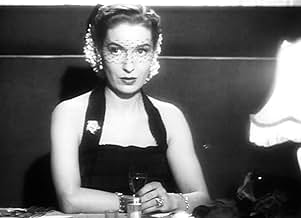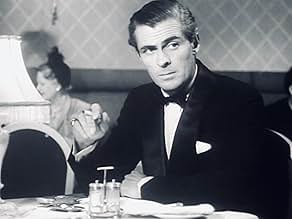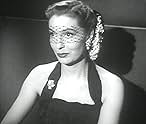A convicted female blackmailer is found murdered in her flat and suspicion falls on three suspects, all of whom Scotland Yard believe may have had reason to wish her dead.A convicted female blackmailer is found murdered in her flat and suspicion falls on three suspects, all of whom Scotland Yard believe may have had reason to wish her dead.A convicted female blackmailer is found murdered in her flat and suspicion falls on three suspects, all of whom Scotland Yard believe may have had reason to wish her dead.
- Director
- Writers
- Stars
Arnold Bell
- Director of Stage Play
- (uncredited)
Alex Graham
- Wine Waiter
- (uncredited)
Victor Harrington
- Flamenco Club Patron
- (uncredited)
Aileen Lewis
- Flamenco Club Patron
- (uncredited)
Alvar Liddell
- BBC Continuity Announcer
- (uncredited)
Pat Ryan
- Flamenco Club Patron
- (uncredited)
Tim Turner
- Bannister
- (uncredited)
Ben Williams
- Accident Car Driver
- (uncredited)
- Director
- Writers
- All cast & crew
- Production, box office & more at IMDbPro
Featured reviews
Murder Will Out opens with, what else, a murder. Specifically of a woman who had an involvement with three men, struggling author Edward Underdown, publisher Henry Kendall, and successful author James Robertson Justice self described as the Field Marshal of English Letters. Robertson Justice is married quite unhappily to Valerie Hobson who shows quite a bit of her most famous screen character Estella from Great Expectations.
Hobson takes her character from Dickens, but Robertson Justice is a British version of Waldo Lydecker from Laura. Mix these two together and you've got the recipe of an English murder mystery with some real bite and a few clever plot twists in the end.
All three of the men and possibly Hobson have some good reason to murder the victim. None of the men have a satisfactory alibi for the time of the murder so Scotland Yard in the persons of Inspector Garry Marsh and Sergeant Sam Kydd have only to wait it out, watch and observe, and see if this resolves itself.
Like some of our B films you occasionally find a real nugget among them and Murder Will Out, a quota quickie over in the UK, definitely fills that bill.
You will particularly love what James Robertson Justice and Valerie Hobson do with their characters. If you're a fan of English murder mysteries this one is a hidden gem.
Hobson takes her character from Dickens, but Robertson Justice is a British version of Waldo Lydecker from Laura. Mix these two together and you've got the recipe of an English murder mystery with some real bite and a few clever plot twists in the end.
All three of the men and possibly Hobson have some good reason to murder the victim. None of the men have a satisfactory alibi for the time of the murder so Scotland Yard in the persons of Inspector Garry Marsh and Sergeant Sam Kydd have only to wait it out, watch and observe, and see if this resolves itself.
Like some of our B films you occasionally find a real nugget among them and Murder Will Out, a quota quickie over in the UK, definitely fills that bill.
You will particularly love what James Robertson Justice and Valerie Hobson do with their characters. If you're a fan of English murder mysteries this one is a hidden gem.
Today ,the broadcast stories (and series) have become a thing of the past ,but when the TV sets did not exist, they would keep the audience glued to their radio .The subject of the film ( a failed writer trying to appropriate a famous one's works ) has become common today .
It begins as a classic whodunit with the usual suspects , but continues with a love triangle , with a cynical wife (angel face Valérie Hobson turning into a femme fatale) urging her lover (Edward Underdown)to do away with her burdensome husband. Both plots are astutely linked in the last fifteen minutes ,although Hobson 's fate is rather derivative .Directing is not exciting ,but acting is effective ,particularly James Robertson Justice ,a cynical victim ,who knows he is terminally ill ,but who thinks revenge is a dish best eaten cold : I like his directing of stage actors: " don't act like a grizzly bear at the mating season " (and it's an euphemism)
It begins as a classic whodunit with the usual suspects , but continues with a love triangle , with a cynical wife (angel face Valérie Hobson turning into a femme fatale) urging her lover (Edward Underdown)to do away with her burdensome husband. Both plots are astutely linked in the last fifteen minutes ,although Hobson 's fate is rather derivative .Directing is not exciting ,but acting is effective ,particularly James Robertson Justice ,a cynical victim ,who knows he is terminally ill ,but who thinks revenge is a dish best eaten cold : I like his directing of stage actors: " don't act like a grizzly bear at the mating season " (and it's an euphemism)
A Female blackmailer is murdered, and one of four people have potentially killed her, the suspects include, her boss, an unsuccessful writer named Hugh, experienced writer Jonathan and his wife Alycia.
Known as Murder will out in The USA, and The voice of Merrill (arguably a better title) her in The UK, it's a B movie, and runs for approximately 90 minutes. Not a film I've ever heard spoken of, so I'm seeing it for the first time, with no prior knowledge of its content.
The story is nothing new, it has been done many, many times, and the script is average at best, but what shines through, the acting. I have adored Valerie Hobson ever since seeing her in Mind hearts and coronets, and she delivers a knockout performance here, equally good is the bombastic James Robertson Justice, he's loud and brash, a great contrast to Hobson.
It's not the most polished looking film you'll ever see, at times it does actually feel a little threadbare, and it really could have done with a bit more suspense, even the music is a little lifeless, but there really is something, maybe it's the expectation, or the curiosity caused by the murder.
The BBC gets a little bit of a pasting (something it's been more than used to for many years) once again, back then it was for being dreary.
7/10.
Known as Murder will out in The USA, and The voice of Merrill (arguably a better title) her in The UK, it's a B movie, and runs for approximately 90 minutes. Not a film I've ever heard spoken of, so I'm seeing it for the first time, with no prior knowledge of its content.
The story is nothing new, it has been done many, many times, and the script is average at best, but what shines through, the acting. I have adored Valerie Hobson ever since seeing her in Mind hearts and coronets, and she delivers a knockout performance here, equally good is the bombastic James Robertson Justice, he's loud and brash, a great contrast to Hobson.
It's not the most polished looking film you'll ever see, at times it does actually feel a little threadbare, and it really could have done with a bit more suspense, even the music is a little lifeless, but there really is something, maybe it's the expectation, or the curiosity caused by the murder.
The BBC gets a little bit of a pasting (something it's been more than used to for many years) once again, back then it was for being dreary.
7/10.
The Voice of Merrill (AKA: Murder Will Out) is directed by John Gilling who also adapts the screenplay from a story written by Terence Austin and Gerald Landeau. It stars Valerie Hobson, James Robertson Justice, Edward Underdown, Gary Marsh and Henry Kendall. Music is by Frank Cordell and cinematography by Monty Berman.
A British Who Done It? Thriller Out of Tempean Films, The Voice of Merrill begins with the murder of a pretty lady, the perpetrator unseen of course, and thus begins a tale of blackmail, illicit affairs, dastardly plotting, sleuthing and the vagaries of fate. It's a complex screenplay in many ways, perhaps unnecessary so, and Gilling strains to make all the threads amount to anything akin to suspense. However, once the momentum builds, and the net closes in on the suspects, the makers unleash some genuine surprises that in turn lead to a dramatic climax of some memorable impact. The acting is only OK, though it's always fun to see Robertson Justice doing one of his big bluff cantankerous acts. 6.5/10
A British Who Done It? Thriller Out of Tempean Films, The Voice of Merrill begins with the murder of a pretty lady, the perpetrator unseen of course, and thus begins a tale of blackmail, illicit affairs, dastardly plotting, sleuthing and the vagaries of fate. It's a complex screenplay in many ways, perhaps unnecessary so, and Gilling strains to make all the threads amount to anything akin to suspense. However, once the momentum builds, and the net closes in on the suspects, the makers unleash some genuine surprises that in turn lead to a dramatic climax of some memorable impact. The acting is only OK, though it's always fun to see Robertson Justice doing one of his big bluff cantankerous acts. 6.5/10
When convicted blackmailer Jean Bridges is murdered, Inspector Thornton of Scotland Yard narrows the list to those suspects who are without alibis: Jean's boyfriend, failing author Hugh Allen; publisher Ronnie Parker, who Jean was blackmailing; and the egotistical and obnoxious playwright Jonathan Roach, who had seen her that day.
Roach suffers with a poor heart, though continues to work and is due to read a series of stories on BBC radio. His dissatisfaction with the stories, however, makes him reluctant to do so and his glamorous wife Alycia suggests that he find someone else to read them instead. She recommends Hugh, who has just become her secret lover. Roach agrees and gives Hugh the pseudonym Merrill. The show becomes a success and, over the many weeks it is broadcast, the public begin to speculate who penned the stories. It is likely that Roach will not live for much longer and Alycia suggests to Hugh that he should claim the stories as his own after her husband dies. The sensation, she believes, will boost his career. However, Roach realises what the pair are up to and devises a plan of his own.
Director John Gilling co-wrote this 1952 film for Robert S. Baker and Monty Berman's Tempean Films. Both would make many B-movies throughout the '50s and this was supposed to be one of them. Though made for £25,000, however, it impressed its distributor enough to be promoted to co-feature status when aired in cinemas. Perhaps the BBC allusions and the A-list talent of Valerie Hobson convinced them that there was more than the usual cops and robbers thriller.
It is certainly easy to forget that it is supposed to involve murder, as much time goes by in which it is not even mentioned and more emphasis is given to the fraud plot involving the radio stories. Indeed, despite the noir-style beginning, most of it plays out like a melodrama and the balance is not always maintained. It does, however, stay within the bounds of the genre and, despite the lack of detecting, the secret romance of Hugh and Alycia is compelling and the character of Roach is as sharply observant as any detective. James Robertson Justice, as Roach, brings his usual gravitas to a role which recalls the other abrasive intellectuals he has given us, mainly in comedies such as Very Important Person, Crooks Anonymous and, of course, the Doctor films.
Despite the witty lines on offer, however, he managers to keep the performance on the right side of comedic. Edward Underdown, meanwhile, is suitably lugubrious as a man who is led by the hand to somewhere he does not want to go. With his quiet suavity, it is easy to imagine the actor in the role of a gentleman detective, like Paul Temple. The character he plays here is tortured both by his conscience and a love for a woman with more nerve than he would even want. He also put me in mind of a young John Le Mesurier.
Valerie Hobson has the showiest part and gets to be everything from cunning, worried, flirtatious and sardonic to desperate, dreamy and hysterical. In one memorable scene, she is visibly conflicted as Roach suffers a heart attack and she considers whether or not she should help or let him die. The actress, though only thirty five, had been in films for twenty years by this point but would soon quit acting and become embroiled in the Profumo affair.
Roach suffers with a poor heart, though continues to work and is due to read a series of stories on BBC radio. His dissatisfaction with the stories, however, makes him reluctant to do so and his glamorous wife Alycia suggests that he find someone else to read them instead. She recommends Hugh, who has just become her secret lover. Roach agrees and gives Hugh the pseudonym Merrill. The show becomes a success and, over the many weeks it is broadcast, the public begin to speculate who penned the stories. It is likely that Roach will not live for much longer and Alycia suggests to Hugh that he should claim the stories as his own after her husband dies. The sensation, she believes, will boost his career. However, Roach realises what the pair are up to and devises a plan of his own.
Director John Gilling co-wrote this 1952 film for Robert S. Baker and Monty Berman's Tempean Films. Both would make many B-movies throughout the '50s and this was supposed to be one of them. Though made for £25,000, however, it impressed its distributor enough to be promoted to co-feature status when aired in cinemas. Perhaps the BBC allusions and the A-list talent of Valerie Hobson convinced them that there was more than the usual cops and robbers thriller.
It is certainly easy to forget that it is supposed to involve murder, as much time goes by in which it is not even mentioned and more emphasis is given to the fraud plot involving the radio stories. Indeed, despite the noir-style beginning, most of it plays out like a melodrama and the balance is not always maintained. It does, however, stay within the bounds of the genre and, despite the lack of detecting, the secret romance of Hugh and Alycia is compelling and the character of Roach is as sharply observant as any detective. James Robertson Justice, as Roach, brings his usual gravitas to a role which recalls the other abrasive intellectuals he has given us, mainly in comedies such as Very Important Person, Crooks Anonymous and, of course, the Doctor films.
Despite the witty lines on offer, however, he managers to keep the performance on the right side of comedic. Edward Underdown, meanwhile, is suitably lugubrious as a man who is led by the hand to somewhere he does not want to go. With his quiet suavity, it is easy to imagine the actor in the role of a gentleman detective, like Paul Temple. The character he plays here is tortured both by his conscience and a love for a woman with more nerve than he would even want. He also put me in mind of a young John Le Mesurier.
Valerie Hobson has the showiest part and gets to be everything from cunning, worried, flirtatious and sardonic to desperate, dreamy and hysterical. In one memorable scene, she is visibly conflicted as Roach suffers a heart attack and she considers whether or not she should help or let him die. The actress, though only thirty five, had been in films for twenty years by this point but would soon quit acting and become embroiled in the Profumo affair.
Did you know
- TriviaMuch of the action takes place in Broadcasting House on Portland Place in London, which is still used by the BBC for radio broadcasting.
- GoofsAll entries contain spoilers
- Quotes
Inspector Thornton: Did you meet any friends?
Jonathan Roche: My friends are out of London.
Inspector Thornton: All of them?
Jonathan Roche: Both of them!
Details
- Release date
- Country of origin
- Language
- Also known as
- Murder Will Out
- Filming locations
- Southall Studios, Southall, Middlesex, England, UK(Studio, uncredited)
- Production company
- See more company credits at IMDbPro
- Runtime
- 1h 23m(83 min)
- Color
- Aspect ratio
- 1.37 : 1
Contribute to this page
Suggest an edit or add missing content

